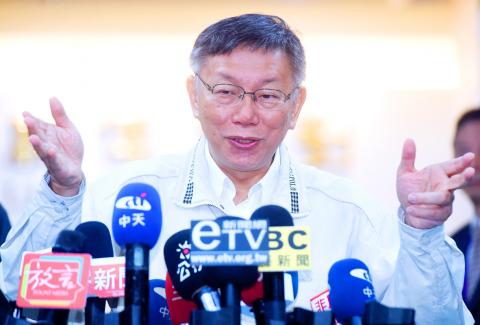The National Taiwan University Hospital (NTUH) yesterday said it does not have a special procedure for treating legislators, while Taipei Mayor Ko Wen-je (柯文哲) said he used to ask legislators to wait in line like everyone else when he worked at the hospital.
Chinese Nationalist Party (KMT) legislators Lin Yi-hua (林奕華) and Chen Yu-jen (陳玉珍) were taken to the hospital’s emergency room after they said they were injured on Friday when a group of KMT legislators and Taipei City Councilors tried to force their way into the Ministry of Foreign Affairs building demanding to see Minister of Foreign Affairs Joseph Wu (吳釗燮).
Chen was placed on a bed in a separate room in the acute and critical care section, after her fingers were caught in a door during the scuffle, and she said she felt dizzy and had difficulty breathing.

Photo: Liao Chen-huei, Taipei Times
Photographs posted online by the KMT showing many party officials visiting the legislators in the emergency room on Saturday sparked a public outcry over the perceived abuse of medical resources.
An Internet user on Sunday posted a flow chart reportedly from the hospital, titled “Procedures for treating legislators or patients they entrusted,” on a physicians’ forum, instructing that if a legislator arrives at the emergency room, they should be placed in the acute and critical care section for treatment or observation.
The hospital issued a statement saying that the flow chart was drawn up more than 10 years ago, but it was not approved by hospital management and is not part of medical professionals’ work procedure.
“When there is a vacancy in the acute and critical care section, the hospital will assist public figures by placing them in separate rooms,” it said, “but we will also inform them that the emergency room is a medical operation area, so interviewing or filming is prohibited, as it involves exposing patient privacy, and that the patient should not be accompanied by more than two people.”
All the patients have been admitted after going through triage and standard procedures so that other patients’ right to healthcare would not be affected, the hospital said.
The hospital apologized to anyone who was affected by the incident.
Ko, who was the head of the hospital’s traumatology department before becoming mayor, was asked about the issue.
“It certainly was not drafted by me,” he said as he looked at the flow chart.
“When I was at the NTUH, the department I was in charge of did not have this SOP [standard operating procedure], but that was five years ago, and I do not know if they changed,” Ko said. “Usually when legislators came, we would tell them to wait in line.”

A preclearance service to facilitate entry for people traveling to select airports in Japan would be available from Thursday next week to Feb. 25 at Taiwan Taoyuan International Airport, Taoyuan International Airport Corp (TIAC) said on Tuesday. The service was first made available to Taiwanese travelers throughout the winter vacation of 2024 and during the Lunar New Year holiday. In addition to flights to the Japanese cities of Hakodate, Asahikawa, Akita, Sendai, Niigata, Okayama, Takamatsu, Kumamoto and Kagoshima, the service would be available to travelers to Kobe and Oita. The service can be accessed by passengers of 15 flight routes operated by

Chinese spouse and influencer Guan Guan’s (關關) residency permit has been revoked for repeatedly posting pro-China videos that threaten national security, the National Immigration Agency confirmed today. Guan Guan has said many controversial statements in her videos posted to Douyin (抖音), including “the red flag will soon be painted all over Taiwan” and “Taiwan is an inseparable part of China,” and expressing hope for expedited reunification. The agency last year received multiple reports alleging that Guan Guan had advocated for armed reunification. After verifying the reports, the agency last month issued a notice requiring her to appear and explain her actions. Guan

GIVE AND TAKE: Blood demand continues to rise each year, while fewer young donors are available due to the nation’s falling birthrate, a doctor said Blood donors can redeem points earned from donations to obtain limited edition Formosan black bear travel mugs, the Kaohsiung Blood Center said yesterday, as it announced a goal of stocking 20,000 units of blood prior to the Lunar New Year. The last month of the lunar year is National Blood Donation Month, when local centers seek to stockpile blood for use during the Lunar New Year holiday. The blood demand in southern Taiwan — including Tainan and Kaohsiung, as well as Chiayi, Pingtung, Penghu and Taitung counties — is about 2,000 units per day, the center said. The donation campaign aims to boost

The Central Weather Administration (CWA) said a magnitude 4.9 earthquake that struck off the coast of eastern Taiwan yesterday was an independent event and part of a stress-adjustment process. The earthquake occurred at 4:47pm, with its epicenter at sea about 45.4km south of Yilan County Hall at a depth of 5.9km, the CWA said. The quake's intensity, which gauges the actual effects of a temblor, was highest in several townships in Yilan and neighboring Hualien County, where it measured 4 on Taiwan's seven-tier intensity scale, the CWA said. Lin Po-yu (林柏佑), a division chief at the CWA's Seismological Center, told a news conference